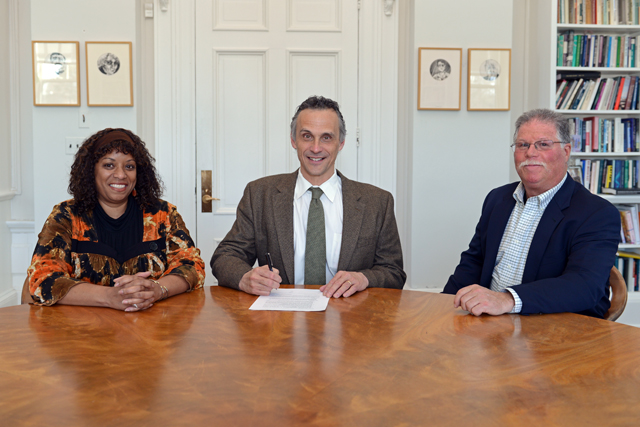COE Graduates May be Admitted to Vermont Law School through New Partnership

Thanks to a new partnership, graduates from Wesleyan’s College of the Environment who meet certain academic standards will be guaranteed admission to Vermont Law School’s prestigious JD (Juris Doctor/Doctor of Law), JD/master’s or master’s degree programs. Vermont’s Environmental Law Program, the largest in the country, is widely considered to be one of the best environmental law programs in the United States.
President Michael S. Roth signed the agreement between Wesleyan and Vermont Law School on Wednesday, April 3.
“We’re excited to provide this option for students in the College of the Environment to take their interdisciplinary exploration of environmental issues to the next level through advanced study of the law, policy and regulation,” said Roth. “The COE was conceived of as a place where scholars can think about translating their research into action in the public sphere. Vermont Law School offers superb programs in environmental law and policy. Earning a JD or master’s degree there certainly will empower our graduates to make an even greater difference in the world.”
“We are delighted to sign this agreement with Wesleyan University and look forward to welcoming qualified graduates from its College of the Environment to the Master’s and the JD degrees offered at Vermont Law School,” said Marc Mihaly, President and Dean of Vermont Law School. “Students from Wesleyan fit the profile of our most successful students – they are smart and committed to making a difference in their communities and, indeed, in the world.”
“In my mind, Vermont Law School is the premier school for environmental law in the country,” remarked Barry Chernoff, director of College of the Environment and Robert Schumann Professor of Environmental Studies. “Pursuing further study in environmental policy, regulation and law will enable our students to influence critical environmental issues facing our country—and the world—over the next century.”
Under the agreement, graduates of Wesleyan’s College of the Environment will be guaranteed admission, with a waiver of all application fees, into Vermont Law School’s JD, Master in Environmental Law and Policy (MELP), or Master in Energy Regulation and Law (MERL) programs. Qualified applicants must complete all requirements to earn a Bachelor’s degree from Wesleyan; complete a minimum of 15 credits for a JD, or 16 credits for a master’s, at Wesleyan; have a cumulative grade point average of 3.2 or higher; earn an LSAT score of 150 or higher for the JD; and present a letter of recommendation from the director of the College of the Environment. The agreement applies to those who have graduated from Wesleyan within four years.
College of the Environment students are especially well-prepared to pursue this type of work after graduation, said Chernoff, because Wesleyan requires them to do their primary scholarship in a particular discipline, and then examine environmental issues from multiple lenses for the Environmental Studies linked major. Majors are also required to complete a capstone project on an environmental topic, principally from the perspective of their primary major, which offers good practice in real world environmental research. The emphasis on critical thinking from an interdisciplinary perspective, which takes into account the viewpoints of all stakeholders, gives “our students a great basis for doing environmental policy work in the future,” Chernoff said.
He added that a significant number of COE graduates currently go on to earn law degrees. Current students he consulted about a partnership with Vermont Law School gave universally positive feedback.
Chernoff said he has, and will continue, to promote the partnership among faculty, students, alumni and prospective students. “I really think it’s important for young people to have interesting opportunities available to them after graduation, and for Wesleyan to provide gateways for students into careers,” he said.
In addition, Chernoff is exploring the development of other partnerships to provide COE students with different avenues for post-graduate education in areas such as public health, environmental management, sustainability and sustainable design.

